Vitamin D for the management of chronic obstructive pulmonary disease
- PMID: 39329240
- PMCID: PMC11428191
- DOI: 10.1002/14651858.CD013284.pub2
Vitamin D for the management of chronic obstructive pulmonary disease
Abstract
Background: COPD is a common, preventable and treatable airway disease, and is currently the third leading cause of death worldwide. About one billion people worldwide are estimated to have vitamin D deficiency or insufficiency. Vitamin D deficiency is common among people with COPD, and has been reported to be associated with reduced lung function and increased risk of acute exacerbations of COPD. Several clinical trials of vitamin D to prevent acute exacerbations of chronic obstructive pulmonary disease (AECOPD) and improve COPD control have been conducted, but an up-to-date meta-analysis of all double-blind, randomised, placebo-controlled trials of this intervention is lacking.
Objectives: To assess the effects of vitamin D for the management of acute exacerbations and symptoms for people with COPD.
Search methods: We searched the Cochrane Airways Trials Register and reference lists of articles. We also searched trial registries directly, and contacted the authors of studies in order to identify additional trials. The date of the last search was 24 August 2022.
Selection criteria: We included double-blind, randomised, placebo-controlled trials of vitamin D or its hydroxylated metabolites, for adults with a clinical diagnosis of chronic obstructive pulmonary disease based on the presence of characteristic symptoms and irreversible airflow obstruction. We did not impose restrictions regarding disease severity or baseline vitamin D status, in order to maximise generalisability.
Data collection and analysis: We used standard Cochrane methods. The primary outcome was the rate of moderate or severe exacerbations (requiring systemic corticosteroids, antibiotics or both). We also performed subgroup analyses to determine whether the effect of vitamin D on the rate of moderate or severe exacerbations was modified by baseline vitamin D status, COPD severity or regular inhaled corticosteroid use. The main secondary outcomes of interest were the proportion of participants experiencing one or more exacerbations (moderate or severe), the change in forced expiratory volume in one second (FEV1, % predicted) and the proportion of participants with one or more serious adverse events of any cause, mortality (all-cause) and quality of life. We used GRADE to assess the certainty of evidence for each outcome.
Main results: We included 10 double-blind, randomised, placebo-controlled trials in this review, involving a total of 1372 adults. Five studies contributed to the primary outcome analysis of the rate of moderate or severe exacerbations requiring systemic corticosteroids, antibiotics or both. The duration of studies ranged from six weeks to 40 months, and all investigated the effects of administering cholecalciferol (vitamin D3). One study included two intervention arms, one where vitamin D3 was given and one where calcitriol (1,25-dihydroxyvitamin D) was given. The majority of participants had mild to moderate COPD, and profound vitamin D deficiency (25-hydroxyvitamin D (25(OH)D) < 25 nmol/L) at baseline was rare (123 participants contributing data to subgroup analysis). Administration of vitamin D or its hydroxylated metabolites results in little to no change in the overall rate of exacerbations requiring systemic corticosteroids, antibiotics or both (rate ratio (RR) 0.98, 95% CI 0.86 to 1.11; 5 studies, 980 participants; high-certainty evidence). Vitamin D supplementation did not influence any meta-analysed secondary outcomes. These were all based on moderate- or high-certainty evidence aside from adverse events and quality of life, which were based on low-certainty evidence. We observed little to no change in the proportion of participants experiencing one or more moderate or severe exacerbations (odds ratio (OR) 0.94, 95% CI 0.72 to 1.24; 5 studies, 980 participants; high-certainty evidence). Additionally, vitamin D probably results in little to no difference in the inter-arm mean change in FEV1 (% predicted) (mean difference 2.82 higher in intervention arm, 95% CI -2.42 to 8.06; 7 studies, 1063 participants; moderate-certainty evidence). There was also probably no effect of vitamin D on the incidence of serious adverse events due to any cause; although we identified an anticipated absolute effect of 36 additional adverse events per 1000 people, the confidence interval included the null hypothesis of no effect (OR 1.19, 95% CI 0.82 to 1.71; 5 studies, 663 participants; moderate-certainty evidence). Vitamin D may have little to no effect on mortality (OR 1.13, 95% CI 0.57 to 2.21; 6 studies, 1019 participants; low-certainty evidence). It also may have little to no effect on quality of life as measured by validated instruments (narrative findings; 5 studies, 663 participants; low-certainty evidence). We assessed one study as being at high risk of bias in at least one domain; this did not contribute data to the meta-analysis of the primary outcome reported above. Sensitivity analysis that excluded this study from the meta-analysed outcome to which it contributed, the inter-arm mean change in FEV1, did not change the findings.
Authors' conclusions: We found that administration of vitamin D results in little to no effect on the rate of moderate or severe exacerbations requiring systemic corticosteroids, antibiotics or both or the proportion of participants experiencing one or more exacerbations (moderate or severe) (both high-certainty evidence). Further, vitamin D probably has no effect on the inter-arm difference in change in lung volumes and the proportion of participants with one or more serious adverse event of any cause (both moderate-certainty evidence), and may make little to no difference to mortality or quality of life (both low-certainty evidence). We recommend further research on the balance of benefits and harms of vitamin D supplements in COPD for those with very low or very high starting vitamin D levels, because we assessed the available evidence as low-certainty for these groups.
Trial registration: ClinicalTrials.gov NCT03679325 NCT03781895.
Copyright © 2024 The Cochrane Collaboration. Published by John Wiley & Sons, Ltd.
Conflict of interest statement
AW: works as a junior doctor at Guy's and St Thomas' Foundation Trust.
ARM declares speaker fees from Linus Pauling Institute (personal payment); consulting fees from DSM Nutritional Products (personal payment); grants from Cytoplan, DSM Nutritional Products Ltd, Hyphens Pharma Ltd, Pharma Nord Ltd, Synergy Biologics and Thornton & Ross Ltd (all paid to institution); and travel expenses from Abiogen Pharma Ltd and Pharma Nord Ltd (both paid to institution). ARM also declares participation on the Data and Safety Monitoring Boards for the VITALITY trial (Vitamin D for adolescents with HIV to reduce musculoskeletal morbidity and immunopathology, NCT01784029), London School of Hygiene and Tropical Medicine, and the Trial of Vitamin D and Zinc Supplementation for Improving Treatment Outcomes Among COVID‐19 Patients in India (NCT04641195), Harvard School of Public Health (both paid to institution). ARM also declares unpaid work as a Programme Committee member for the Vitamin D Workshop. ARM declares that he has given opinions on the topic in multiple interviews in printed and broadcast media. Lastly, ARM declares being involved in two studies eligible for inclusion in the review. The first, Martineau 2015, was funded by NIHR and sponsored by Queen Mary University of London*. This study was assessed by AW and JS for eligibility, data extraction and risk of bias, and by AW and AS for certainty of evidence**. The second, Camargo 2021, was funded by the Health Research Council of New Zealand* and assessed by AW and CJG for inclusion, data extraction and risk of bias, and by AW and AS for certainty of evidence**.
DJ: investigator on a study included in the review (Martineau 2015); the study was funded by the NIHR and sponsored by Queen Mary University of London*. This study was assessed by AW and JS for eligibility, data extraction and risk of bias, and by AW and AS for certainty of evidence**.
AS: works as a Consultant in Paediatric Allergy.
WJ works as a health professional at KU Leuven. WJ declares having received grants, consultancy fees and payments for advisory board activities from Astra Zeneca, Chiesi and Boehringer Ingelheim (none of whom manufacture or distribute vitamin D), all paid to his institution (KU Leuven). WJ declares that he was involved in a study eligible for inclusion in the review (Lehouck 2012); the study was funded by FWO Vlaanderen*, paid to KU Leuven. This study was assessed by AW and ARM for inclusion, data extraction, risk of bias and certainty of evidence**.
JS: declares that he was involved in the analysis and publication of the ViDA study (Camargo 2021), which is included in the review; the study was funded by the Health Research Council of New Zealand*. This study was assessed by AW and CJS for inclusion, data extraction, risk of bias and certainty of evidence**.
RR: declares that she was involved in the Rafiq 2017 study included in the review, which had no specific funding sources. She was also involved in the Rafiq 2022 study included in the review; this study was funded by a grant from the Lung Foundation, Netherlands (project number 5.1.13.033) and an unrestricted grant from Almirall (who do not manufacture vitamin D)*. These two studies were assessed by AW and ARM for inclusion, data extraction, risk of bias and certainty of evidence**.
RdJ: declares speaker fees from Amgen (personal payment) and a grant from Takeda Pharmaceutical Company (paid to institution; however, she has control over the funds) for a pharmacy‐initiated study (SHP634‐401) on which she is principal investigator; neither of these companies manufacture or distribute vitamin D. RdJ also declares writing assistance from Faes Farma SA, who produce calcifediol (paid to institution). Further, RdJ declares that she was the principal investigator on two RCTs included in this Cochrane review. The first, Rafiq 2017, had no specific funding sources. The second, Rafiq 2022, was funded by a grant from the Lung Foundation, Netherlands (project number 5113033) and an unrestricted grant from Almirall (who do not manufacture vitamin D)*. These two studies were assessed by AW and ARM for inclusion, data extraction, risk of bias and certainty of evidence**.
CJG: is supported by the National Institute for Health Research ARC North Thames; the views expressed in this publication are those of the author(s) and not necessarily those of the National Institute for Health Research or the Department of Health and Social Care. CJG is a collaborator on the Genes & Health study, which is funded by Alnylam Pharmaceuticals, Genomics PLC; and a Life Sciences Industry Consortium of AstraZeneca, Bristol‐Myers Squibb, GlaxoSmithKline, Maze Therapeutics, Merck Sharp and Dohme, Novo Nordisk, Pfizer and Takeda Development Center Americas Inc (none of whom produce or distribute vitamin D or cholecalciferol), all paid to institution. CJG received funds to enable his institution to host an academic conference on the clinical aspects of vitamin D. CJG declares that he was a trialist on a study eligible for inclusion in the review (Martineau 2015); the study was funded by NIHR*. This study was assessed by AW and JS for eligibility, data extraction and risk of bias, and by AW and AS for certainty of evidence**.
*For each study with declared funders, the funders played no role in the design, conduct or publication of the research.
**To minimise the risk of bias, authors who were investigators on any study to be included in the review were not involved in the decision about eligibility, nor did they extract data, or assess the risk of bias for that study or GRADE the overall certainty of outcomes to which the study contributed. These tasks were performed by two independent review authors.
Figures
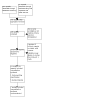

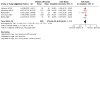
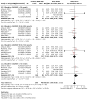
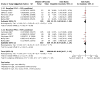
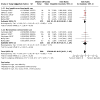
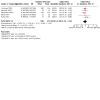
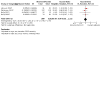
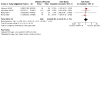
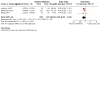
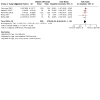
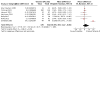
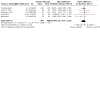
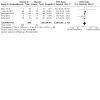
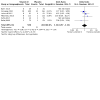
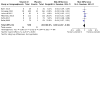
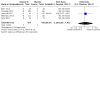
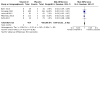
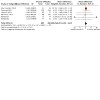
Update of
- doi: 10.1002/14651858.CD013284
References
References to studies included in this review
Alavi Foumani 2019 {published data only}
-
- Alavi Foumani A, Mehrdad M, Jafarinezhad A, Nokani K, Jafari A. Impact of vitamin D on spirometry findings and quality of life in patients with chronic obstructive pulmonary disease: a randomized, double-blinded, placebo-controlled clinical trial. International Journal of Chronic Obstructive Pulmonary Disease 2019;14:1495-501. [DOI: 10.2147/COPD.S207400] - DOI - PMC - PubMed
Bjerk 2013 {published and unpublished data}
Camargo 2021 {published and unpublished data}
-
- Camargo CA, Toop L, Sluyter J, Lawes CM, Waayer D, Khaw K, et al. Effect of monthly vitamin D supplementation on preventing exacerbations of asthma or chronic obstructive pulmonary disease in older adults: post hoc analysis of a randomized controlled trial. Nutrients 2021;13(2):521. [DOI: 10.3390/nu13020521] - DOI - PMC - PubMed
Dastan 2019 {published data only}
-
- Dastan F, Salamzadeh J, Pourrashid MH, Edalatifard M, Eslaminejad A. Effects of high-dose vitamin D replacement on the serum levels of systemic inflammatory biomarkers in patients with acute exacerbation of chronic obstructive pulmonary disease. COPD: Journal of Chronic Obstructive Pulmonary Disease 2019;16(3-4):278-83. [DOI: 10.1080/15412555.2019.1666812] - DOI - PubMed
Lehouck 2012 {published and unpublished data}
Martineau 2015 {published and unpublished data}
-
- Martineau AR, James WY, Hooper RL, Barnes NC, Jolliffe DA, Greiller CL, et al. Vitamin D3 supplementation in patients with chronic obstructive pulmonary disease (ViDiCO): a multicentre, double-blind, randomised controlled trial. Lancet. Respiratory Medicine 2015;3(2):120-30. [DOI: 10.1016/S2213-2600(14)70255-3] - DOI - PubMed
Rafiq 2017 {published and unpublished data}
-
- Rafiq R, Prins HJ, Boersma WG, Daniels JM, den Heijer M, Lips P, et al. Effects of daily vitamin D supplementation on respiratory muscle strength and physical performance in vitamin D-deficient COPD patients: a pilot trial. International Journal of Chronic Obstructive Pulmonary Disease 2017;12:2583–92. [DOI: 10.2147/COPD.S132117] - DOI - PMC - PubMed
Rafiq 2022 {published and unpublished data}
-
- Rafiq R, Aleva FE, Schrumpf JA, Daniels JM, Bet PM, Boersma WG, et al. Vitamin D supplementation in chronic obstructive pulmonary disease patients with low serum vitamin D: a randomized controlled trial. American Journal of Clinical Nutrition 2022;116(2):491–9. [DOI: 10.1093/ajcn/nqac083] - DOI - PMC - PubMed
Sanjari 2016 {published data only}
References to studies excluded from this review
EudraCT2014‐001250‐41 {published data only (unpublished sought but not used)}EudraCT2014‐001250‐41
-
- EudraCT2014-001250-41. The impact of vitamin D on physical training of vitamin D deficient patients with COPD: a prospective randomized placebo-controlled double-blind multi-centre study. www.clinicaltrialsregister.eu/ctr-search/trial/2014-001250-41/SE (first received 27 February 2015).
IRCT20190810044500N12 {published data only}IRCT20190810044500N12
-
- IRCT20190810044500N12. Effectiveness of vitamin D in COPD [Effectiveness of vitamin D supplementation in quality of life of patients with chronic obstructive pulmonary disease and vitamin D deficiency]. en.irct.ir/trial/46842 (first received 6 May 2021).
Mølmen 2021 {published and unpublished data}
NCT03679325 {published data only}
-
- NCT03679325. Evaluation of cardiac variability after a vitamine D protocol and whole body vibration [Heart rate variability in healthy older and older COPD after vitamine D use and whole body vibration protocol]. classic.clinicaltrials.gov/ct2/show/NCT03679325 (first received 20 September 2018).
Rutten 2015 {published data only}
-
- Rutten E, Vanfleteren L, Wouters EF, Martens IM, Franssen FM, Spruit MA. OR033: Vitamin D deficiency in patients with COPD entering pulmonary rehabilitation. Clinical Nutrition 2015;34(Suppl 1):S14. [DOI: 10.1016/S0261-5614(15)30133-3] - DOI
References to studies awaiting assessment
Khan 2017 {published data only}
References to ongoing studies
Beijers 2022 {published data only}
-
- Beijers RJ, Iersel LE, Schuurman LT, Hageman RJ, Simons SO, Helvoort A, et al. Effect of targeted nutrient supplementation on physical activity and health-related quality of life in COPD: study protocol for the randomised controlled NUTRECOVER trial. BMJ Open 2022;12(3):e059252. [DOI: 10.1136/bmjopen-2021-059252] [PMID: ] - DOI - PMC - PubMed
Gold 2016 {published data only}
-
- Gold DR, Litonjua AA, Carey VJ, Manson JE, Buring JE, Lee IM, et al. Lung VITAL: rationale, design, and baseline characteristics of an ancillary study evaluating the effects of vitamin D and/or marine omega-3 fatty acid supplements on acute exacerbations of chronic respiratory disease, asthma control, pneumonia and lung function in adults. Contemporary Clinical Trials 2016;47:185-95. [DOI: 10.1016/j.cct.2016.01.003] - DOI - PMC - PubMed
IRCT201402029014N23 {published data only (unpublished sought but not used)}IRCT201402029014N23
-
- IRCT201402029014N23. The effect of vitamin D supplementation versus placebo on chronic obstructive pulmonary diseases [The effect of vitamin D supplementation versus placebo on chronic obstructive pulmonary diseases: a triple blinded randomized clinical trial]. en.irct.ir/trial/9462?revision=9462 (first received 26 May 2014).
IRCT2016022826816N1 {published data only (unpublished sought but not used)}IRCT2016022826816N1
-
- IRCT2016022826816N1. Prevention of COPD exacerbation by normalizing serum vitamin D3 level [Study of the effect of vitamine D3 on incidence of exacerbations and infections of ‘chronic obstructive pulmonary disease’ patients (COPD) with serum levels of vitamine D less than 75 nmol/L]. www.irct.ir/trial/22124 (first received 5 May 2016).
NCT03781895 {published data only}
-
- NCT03781895. Effect of vitamin D3 on lung function and exercise tolerance in COPD patients [Effect of vitamin D3 on lung function and exercise tolerance in D3 deficient COPD patients]. classic.clinicaltrials.gov/ct2/show/NCT03781895 (first received 20 December 2018).
Additional references
Adeloye 2022
-
- Adeloye D, Song P, Zhu Y, Campbell H, Sheikh A, Rudan I. Global, regional, and national prevalence of, and risk factors for, chronic obstructive pulmonary disease (COPD) in 2019: a systematic review and modelling analysis. Lancet. Respiratory Medicine 2022;10(5):447-58. [DOI: 10.1016/S2213-2600(21)00511-7] - DOI - PMC - PubMed
Alma 2006
-
- Alma H, Jong C, Jelusic D, Wittmann M, Schuler M, Flokstra-de Blok B, et al. Health status instruments for patients with COPD in pulmonary rehabilitation: defining a minimal clinically important difference. NPJ Primare Care Respiratory Medicine 2016;26:16041. [DOI: 10.1038/npjpcrm.2016.41] [PMID: ] - DOI - PMC - PubMed
Anthonisen 1987
Bae 2020
Bouillon 2022
Burge 2003
Cazzola 2008
Celli 2019
Chen 2019
Dhamane 2015
Ginde 2009
GRADEpro GDT [Computer program]
-
- GRADEpro GDT. Version accessed 28 December 2023. Hamilton (ON): McMaster University (developed by Evidence Prime), 2023. Available at gradepro.org.
Greiller 2015
Guyatt 1987
Han 2017
Hansdottir 2008
Heulens 2015
Higgins 2017
-
- Higgins JP, Altman DG, Sterne JA, editor(s). Chapter 8: Assessing risk of bias in included studies. In: Higgins JP, Churchill R, Chandler J, Cumpston MS, editor(s), Cochrane Handbook for Systematic Reviews of Interventions Version 5.2.0 (updated June 2017). Cochrane, 2017. https://training.cochrane.org/handbook/archive/v5.2. [URL: www.training.cochrane.org/handbook.]
Higgins 2022
-
- Higgins JP, Thomas J, Chandler J, Cumpston M, Li T, Page MJ, Welch VA, editor(s). Cochrane Handbook for Systematic Reviews of Interventions Version 6.3 (updated February 2022). Cochrane, 2022. Available from training.cochrane.org/handbook.
Holick 2007
Hurst 2010
Inoue 2016
Jolliffe 2018
-
- Jolliffe DA, James WY, Hooper RL, Barnes NC, Greiller CL, Islam K, et al. Prevalence, determinants and clinical correlates of vitamin D deficiency in patients with chronic obstructive pulmonary disease in London, UK. Journal of Steroid Biochemistry and Molecular Biology 2018;175:138-45. [DOI: 10.1016/j.jsbmb.2017.01.019] - DOI - PubMed
Jolliffe 2019
Jolliffe 2021
-
- Jolliffe DA, Camargo CA, Sluyter JD, Aglipay M, Aloia JF, Ganmaa D, et al. Vitamin D supplementation to prevent acute respiratory infections: a systematic review and meta-analysis of aggregate data from randomised controlled trials. Lancet. Diabetes & Endocrinology 2021;9(5):276-92. [DOI: 10.1016/S2213-8587(21)00051-6] - DOI - PubMed
Jones 1992
Kunisaki 2012
-
- Kunisaki KM, Niewoehner DE, Connett JE, COPD Clinical Research Network. Vitamin D levels and risk of acute exacerbations of chronic obstructive pulmonary disease: a prospective cohort study. American Journal of Respiratory and Critical Care Medicine 2012;185(3):286-90. [DOI: 10.1164/rccm.201109-1644OC] - DOI - PMC - PubMed
Li 2020
Liu 2006
Malinovschi 2014
Martineau 2017
Moher 2009
Page 2023
-
- Page MJ, Higgins JP, Sterne JA. Chapter 13: Assessing risk of bias due to missing results in a synthesis. In: Higgins JP, Thomas J, Chandler J, Cumpston M, Li T, Page MJ, Welch VA, editor(s). Cochrane Handbook for Systematic Reviews of Interventions version 6.4 (updated August 2023). Cochrane, 2023. Available from www.training.cochrane.org/handbook.
Peruzza 2003
Puhan 2014
Quint 2012
RevMan 2020 [Computer program]
-
- Review Manager (RevMan). Version 4.12.0. The Cochrane Collaboration, 2020. Available at revman.cochrane.org.
Sapey 2006
Schünemann 2023
-
- Schünemann HJ, Higgins JP, Vist GE, Glasziou P, Akl EA, Skoetz N, Guyatt GH. Chapter 14: Completing ‘Summary of findings’ tables and grading the certainty of the evidence. In: Higgins JP, Thomas J, Chandler J, Cumpston M, Li T, Page MJ, Welch VA, editor(s). Cochrane Handbook for Systematic Reviews of Interventions version 6.4 (updated August 2023). Cochrane, 2023. Available from www.training.cochrane.org/handbook.
Scragg 2017
-
- Scragg R, Stewart AW, Waayer D, Lawes CMM, Toop L, Sluyter J, et al. Effect of monthly high-dose vitamin D supplementation on cardiovascular disease in the vitamin D assessment study: a randomized clinical trial. JAMA Cardiology 2017;2(6):608-16. [DOI: 10.1001/jamacardio.2017.0175] - DOI - PMC - PubMed
Singh 2022
Stone 2023
Vogelmeier 2017
-
- Vogelmeier CF, Criner GJ, Martinez FJ, Anzueto A, Barnes PJ, Bourbeau J, et al. Global strategy for the diagnosis, management, and prevention of chronic obstructive lung disease 2017 report. GOLD executive summary. American Journal of Respiratory and Critical Care Medicine 2017;195(5):557-82. [DOI: 10.1183/13993003.00214-2017] - DOI - PubMed
WHO 2023
-
- World Health Organization. Chronic obstructive pulmonary disease (COPD). Accessed on 30 March 2024: https://www.who.int/news-room/fact-sheets/detail/chronic-obstructive-pul... 2023.
Williams 2001
Yang 2022
-
- Yang H, Sun D, Wu F, Xu X, Liu X, Wang Z, et al. Effects of vitamin D on respiratory function and immune status for patients with chronic obstructive pulmonary disease (COPD): a systematic review and meta-analysis. Computational and Mathematical Methods in Medicine 2022;2910782:1-14. [DOI: 10.1155/2022/2910782] - DOI - PMC - PubMed
References to other published versions of this review
Publication types
MeSH terms
Substances
Associated data
LinkOut - more resources
Full Text Sources
Medical

